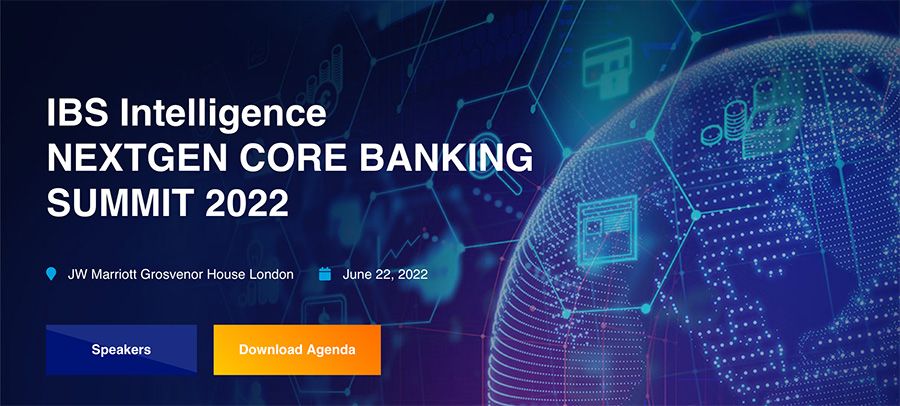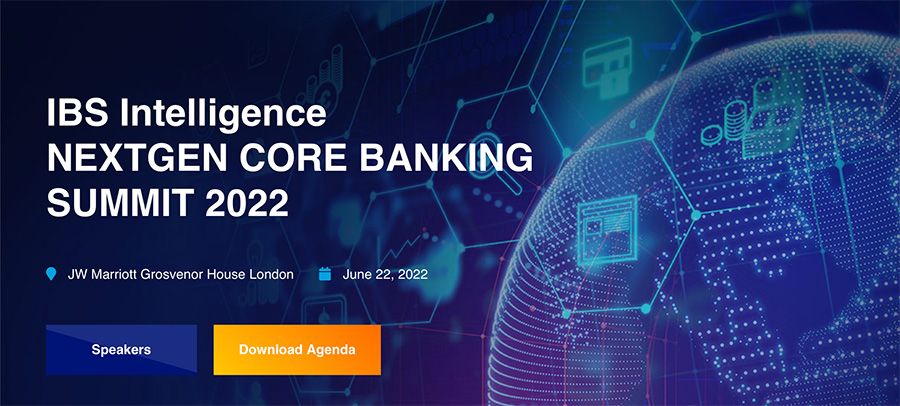Next month, IBS Intelligence is hosting its NextGen Core Banking Summit 2022, one of the leading business events for technology leaders and subject matter experts in the world of banking.
This year’s summit focuses on the future of core banking systems, which stand at the centre of any bank’s digital transformation strategy. Core banking systems drive a bank’s customer operations across channels, facilitate the internal processes that enable services, and provide the architecture for integration with other applications, among others.
The evolution of core banking platforms has over the past years accelerated, driven by significant technology trends, the rise of FinTechs and BigTechs, and the changing landscape of customer preferences.

To place the growing interest for core banking renewal into context: in the last five years, 2,500+ core banking deals have been signed, with increasing adoption of cloud-based models, as banks seek to deliver on their twin objectives of being future-ready (optimising omnichannel and digital experiences, higher degree of personalisation, integration with open banking ecosystems, etc) while optimising costs.
During the summit, which will take place at the JW Marriott Grosvenor House in London, participants will be walked through some of the top trends in the core banking systems industry, and its future. Then, keynotes and panels throughout the day will guide participants in more detail through market developments, and how they can navigate opportunities to advance their own core banking operations and infrastructure.
Interested in attending? Request an invitation for the NextGen Core Banking Summit 2022.
Speakers include leading figures from the world of core banking intelligence (such as Robin Amlot and V Ramkumar from IBS Intelligence), industry (such as Conrad Ford, Chief Product Officer at Allica Bank; Michael Rennie, Chief Operating Officer at Cynergy Bank; and Mark Jenkinson, Chief Strategy Officer at Chetwood Financial), and technology players (with TCS, Sopra and Skaleet among the event’s sponsors).
A round-up of the keynotes and panel sessions:
CORE BANKING MARKETS OVERVIEW & TRENDS
What are the top trends and developments in the core banking market?
NEXT GENERATION CORE BANKING
As we move into the next generation core banking platforms, the architecture considerations have evolved not only in terms of flexibility and extensibility, but also in terms of modularity, micro-services, and digital ecosystem engagement. What does this mean for banks and what is the future of next-generation core banking?
LEVERAGING CLOUD – DRIVING SCALE & EFFICIENCIES
Cloud adoption is expected to facilitate scalability and faster response to market requirements. What does it take to have a cloud-native and collaborative platform that is also secure and customer-centric? How much cost would cloud adoption drive down in the core banking context?
DRIVING MARKETPLACE WITH API ECOSYSTEM & OPEN BANKING
The bi-directional data flow enabled through API banking, now facilitates third-party providers to innovate, create and offer new services in a highly inter-operable marketplace ecosystem. What does this collaborative open-banking environment mean for next generation core banking?
CORE BANKING ROI – QUALITATIVE AND QUANTITATIVE OUTLOOK
The business case for any core banking investment decision has always had the need for spelling out the ROI. What goes into defining the qualitative and quantified benefits for the next generation core banking platforms? Are the time-frames of ROI measurement shrinking? How has the total cost of ownership paradigm changed with SaaS models and their Capex / Opex considerations?
HOLLOWING THE CORE
Does “hollow-the-core” necessarily mean rip and replace, or is this more about delayering? What are the considerations in choosing between end-to-end universal banking platforms against a digital-only core? How does the hollow-the-core approach address consolidated customer information vis-a-vis product processing?




